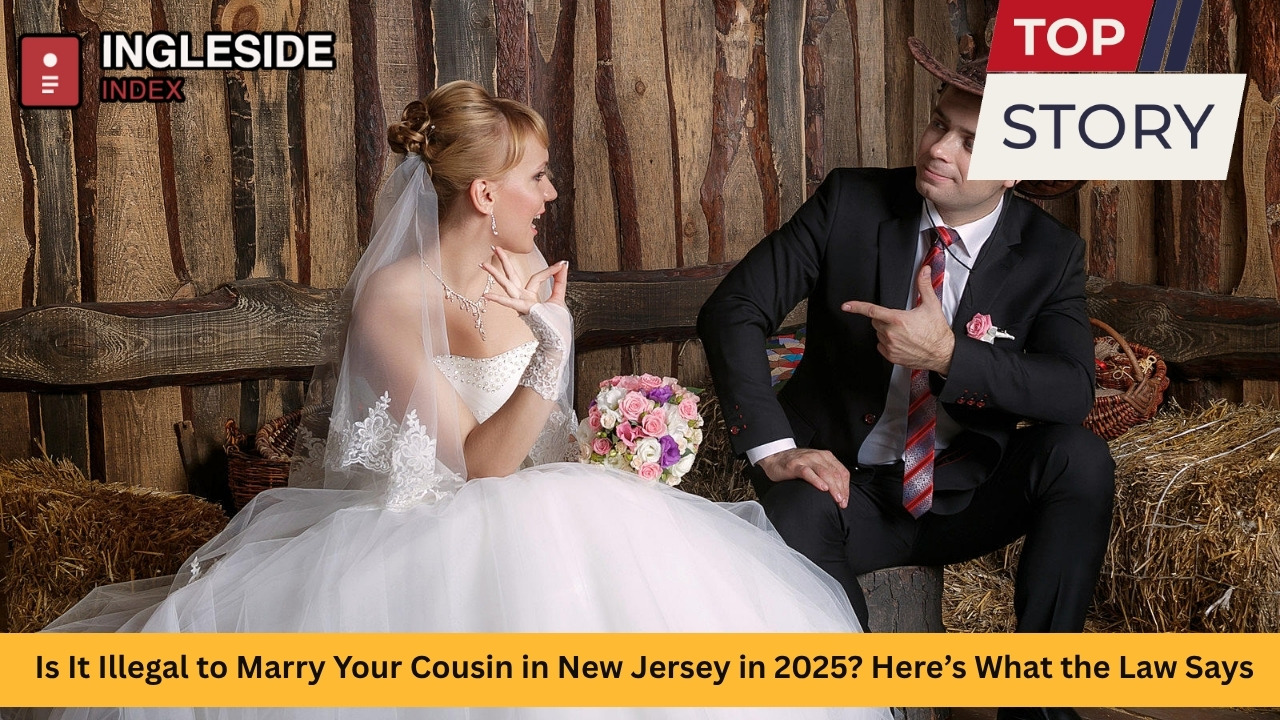The question of cousin marriage legality often arises when families are planning weddings or when individuals with family connections are considering marriage. In New Jersey, as in many states across America, the laws surrounding cousin marriage are clear and specific. Understanding these regulations is crucial for anyone contemplating such a union, as violations can have serious legal consequences.
Understanding New Jersey’s Marriage Laws
New Jersey maintains strict regulations regarding who can legally marry within the state. The Garden State’s marriage laws are codified in Title 37 of the New Jersey Statutes, which outlines prohibited relationships and the requirements for valid marriages. These laws exist to protect individuals and maintain social order while respecting personal freedoms within legal boundaries.
The state’s approach to marriage regulation reflects both historical precedent and contemporary understanding of genetics and family dynamics. New Jersey lawmakers have crafted these statutes to balance individual liberty with public health considerations, creating a framework that governs one of society’s most fundamental institutions.
Current Legal Status of Cousin Marriage
First cousin marriage is completely legal in New Jersey as of 2025. This means that individuals who are first cousins can obtain marriage licenses and legally wed within the state without any restrictions or special requirements beyond the standard marriage license procedures.
New Jersey joins approximately nineteen other states that permit first cousin marriage without conditions. This legal stance places the Garden State among the more permissive jurisdictions in the United States regarding cousin marriage, contrasting sharply with states that either prohibit such unions entirely or require genetic counseling before permitting them.
The legality extends to both residents and non-residents who choose to marry in New Jersey. Couples from states where cousin marriage is prohibited can travel to New Jersey to legally wed, though they should be aware that their home state may not recognize the marriage upon their return.
Historical Context of Cousin Marriage Laws
Evolution of Marriage Regulations
Marriage laws in New Jersey have evolved significantly since the colonial period. During the early days of American settlement, cousin marriage was relatively common and socially accepted, particularly among wealthy families seeking to preserve property and social status. The practice was especially prevalent in rural communities where the population was limited and families often intermarried by necessity.
The nineteenth century brought changing attitudes toward cousin marriage, influenced by emerging scientific understanding of genetics and heredity. However, New Jersey maintained its permissive stance even as other states began implementing restrictions. This consistency in approach reflects the state’s legal tradition of minimizing government interference in personal relationships while maintaining necessary protections.
Influence of Religious and Cultural Factors
New Jersey’s diverse population has historically included many communities where cousin marriage was culturally accepted or even preferred. Immigration patterns brought families from regions where such marriages were traditional, including parts of Europe, the Middle East, and South Asia. The state’s legal framework accommodated these cultural practices while ensuring compliance with American legal standards.
Religious considerations also played a role in shaping New Jersey’s approach. Various faith traditions have different perspectives on cousin marriage, with some encouraging it for religious or cultural reasons while others discourage or prohibit it. New Jersey’s secular legal framework allows religious communities to follow their traditions within the bounds of state law.
Degrees of Relationship and Legal Distinctions
Understanding Cousin Classifications
New Jersey law makes important distinctions between different degrees of cousins and relationships. First cousins share grandparents, making them related in the second degree of consanguinity. This relationship is specifically permitted under New Jersey law without restrictions.
Second cousins, who share great-grandparents, are also permitted to marry in New Jersey, as are more distant cousin relationships. The law becomes more restrictive as relationships become closer, with marriages between siblings, parents and children, and other close relatives being strictly prohibited.
Prohibited Relationships
While cousin marriage is legal, New Jersey strictly prohibits marriages between closer relatives. These prohibited relationships include:
- Parent and child relationships
- Grandparent and grandchild relationships
- Sibling relationships (including half-siblings)
- Aunt/uncle and niece/nephew relationships
- Stepparent and stepchild relationships in certain circumstances
These prohibitions exist both for genetic health reasons and to protect family structures from potential exploitation or coercion.
The Marriage License Process for Cousins
Standard Requirements
Cousins seeking to marry in New Jersey must follow the same procedures as any other couple. This includes obtaining a marriage license from the local registrar in the municipality where the ceremony will take place. The process requires both parties to appear in person with proper identification and pay the required fees.
Required documentation typically includes government-issued photo identification, such as a driver’s license or passport, and certified copies of birth certificates. If either party has been previously married, documentation of divorce or spouse’s death must be provided.
No Special Restrictions or Requirements
Unlike some states that permit cousin marriage with conditions, New Jersey imposes no special requirements on cousins seeking to marry. There are no mandatory genetic counseling sessions, waiting periods beyond the standard requirements, or health screenings specifically for cousin couples.
This streamlined approach reflects New Jersey’s position that competent adults should be free to make their own marriage decisions without unnecessary government interference, provided they meet basic legal requirements and are not within prohibited degrees of relationship.
Geographic Variations Across New Jersey
Urban vs Rural Attitudes
While the law is uniform across New Jersey, social attitudes toward cousin marriage can vary significantly between different regions of the state. Urban areas like Newark, Jersey City, and Trenton tend to be more cosmopolitan and accepting of diverse marriage practices, reflecting their multicultural populations and exposure to various cultural traditions.
Rural areas of New Jersey, particularly in the southern and northwestern counties, may have more traditional views on marriage and family structures. However, even in these areas, the legal right to cousin marriage is protected and available to those who choose to exercise it.
County-Level Implementation
All twenty-one counties in New Jersey are required to implement the state’s marriage laws uniformly. From Bergen County in the north to Cape May County at the southern tip, local registrars must issue marriage licenses to qualified cousin couples without discrimination or additional barriers.
Some counties, particularly those with larger immigrant populations like Hudson, Essex, and Middlesex counties, may have more experience processing cousin marriage applications due to cultural traditions within their communities. However, the legal process remains standardized across all jurisdictions.
National Comparison and Statistics
State-by-State Legal Landscape
New Jersey’s permissive approach to cousin marriage places it in a minority among American states. Currently, approximately nineteen states allow first cousin marriage without restrictions, while others impose various conditions or prohibit it entirely.
States like California, New York, and Connecticut also permit cousin marriage, creating a corridor of permissive states along the eastern seaboard. Conversely, states in the South and Midwest tend to be more restrictive, with some imposing criminal penalties for cousin marriage.
Demographic Data and Trends
While precise statistics on cousin marriage rates are limited, research suggests that such unions represent a very small percentage of all marriages in the United States. The practice is more common in certain immigrant communities and among families with specific cultural or religious traditions.
In New Jersey, the state’s diverse population includes communities where cousin marriage is culturally accepted, potentially leading to higher rates than the national average, though comprehensive data is not readily available.
Genetic and Health Considerations
Scientific Understanding
Modern genetic science has provided clearer understanding of the risks associated with cousin marriage. First cousins share approximately 12.5% of their genetic material, which does increase the risk of recessive genetic disorders in offspring compared to unrelated couples.
However, the actual risk increase is often misunderstood by the general public. While there is an elevated risk, it is not as dramatic as commonly believed, and many cousin couples have healthy children without genetic complications.
Public Health Perspective
New Jersey’s decision to allow cousin marriage without mandatory genetic counseling reflects a balance between individual liberty and public health concerns. The state recognizes that while there are potential risks, these are manageable and should not override personal choice in marriage decisions.
Healthcare providers in New Jersey can offer genetic counseling to cousin couples who request it, providing information about potential risks and helping couples make informed decisions about family planning.
Cultural and Religious Perspectives
Diverse Community Views
New Jersey’s multicultural population brings various perspectives on cousin marriage to the state. Some communities view such marriages as preferred for maintaining family cohesion and cultural traditions, while others may discourage or stigmatize the practice.
Islamic, Hindu, and Jewish communities in New Jersey may have different traditional approaches to cousin marriage, with some considering it acceptable or even beneficial under certain circumstances. The state’s legal framework accommodates these diverse viewpoints while maintaining secular governance.
Religious Freedom Considerations
New Jersey’s approach to cousin marriage reflects broader principles of religious freedom and cultural accommodation. By not imposing restrictions beyond basic legal requirements, the state allows religious and cultural communities to follow their traditions within the bounds of law.
This approach recognizes that marriage practices are deeply intertwined with cultural and religious identity, and that government interference should be minimized when possible while still protecting individual rights and public welfare.
Legal Consequences and Recognition
Validity and Recognition
Cousin marriages performed legally in New Jersey are fully valid and recognized by the state for all legal purposes. This includes property rights, inheritance, medical decision-making, and all other benefits and responsibilities of marriage.
The marriages are also generally recognized by the federal government for immigration, tax, and other federal law purposes, regardless of the couple’s state of residence after the wedding.
Interstate Recognition Challenges
Couples who marry in New Jersey but later move to states that prohibit cousin marriage may face recognition challenges. While the Full Faith and Credit Clause of the Constitution generally requires states to recognize marriages performed legally in other states, some courts have made exceptions for marriages that violate the public policy of the recognizing state.
This creates potential complications for cousin couples who may need to carefully consider their future residence plans and seek legal advice about potential recognition issues.
Future Outlook and Potential Changes
Legislative Trends
Currently, there are no pending legislative proposals in New Jersey to change the state’s permissive approach to cousin marriage. The existing law appears stable and well-established, with no significant political pressure for modification.
National trends suggest that states are more likely to liberalize marriage laws than restrict them, as seen with same-sex marriage recognition. This suggests that New Jersey’s current approach is likely to remain unchanged for the foreseeable future.
Social Evolution
Changing demographics and continued immigration may influence social attitudes toward cousin marriage in New Jersey. As the state becomes increasingly diverse, exposure to different cultural practices may lead to greater acceptance and understanding of various marriage traditions.
However, assimilation pressures and generational changes within immigrant communities may also lead to declining rates of cousin marriage as families adopt broader American social norms.
Practical Advice for Couples
Legal Consultation
Couples considering cousin marriage in New Jersey should consider consulting with family law attorneys, particularly if they plan to relocate to other states or have complex family situations. Legal advice can help navigate potential recognition issues and ensure full understanding of rights and responsibilities.
Family Planning Considerations
While not legally required, couples may benefit from genetic counseling to understand potential risks and make informed decisions about family planning. Many healthcare providers in major New Jersey cities like Newark, Paterson, and Elizabeth offer such services.
Community Support
Couples should also consider the social and family dynamics surrounding their decision. While legally permissible, cousin marriage may still face social stigma in some communities, and couples should be prepared to address these challenges.
Conclusion
New Jersey’s clear legal stance permitting cousin marriage reflects the state’s broader approach to personal liberty and cultural accommodation. The absence of restrictions beyond standard marriage requirements provides couples with the freedom to make their own decisions while maintaining necessary legal protections.
Understanding these laws is crucial for anyone considering such a union, as is awareness of potential challenges in other jurisdictions. While the practice remains relatively uncommon, New Jersey’s legal framework ensures that those who choose cousin marriage can do so with full legal recognition and protection.
The state’s approach balances individual rights with public welfare concerns, creating a framework that respects cultural diversity while maintaining legal clarity. As demographic trends continue to evolve, New Jersey’s permissive stance positions it as a welcoming jurisdiction for couples from diverse backgrounds seeking to formalize their relationships within the bounds of law.
For couples considering cousin marriage in New Jersey, the path forward is legally clear and straightforward. With proper planning, legal consultation when appropriate, and awareness of potential challenges, such unions can proceed with full legal validity and recognition within the Garden State.




